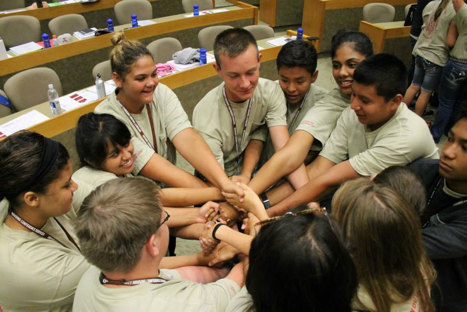
FAYETTEVILLE, Ark. — The Indigenous Food and Agriculture Initiative, based in the University of Arkansas School of Law, has received a three-year, $681,459 grant to fund the Native Youth in Agriculture Summer Leadership Summit.
The summit, now entering its third year, is currently accepting applications from American Indian, Native Hawaiian and Alaska Native youth, ages 15-18. In 2015, 84 students representing 47 tribes attended the summit, and the program hopes to serve 100 youth this year. Contact the Indigenous Food and Agriculture Initiative or visit the website for more information or an application. Older students should consider applying to be a student leader for the program.
“The Indigenous Food and Agricultural Initiative is a great illustration of how higher education institutions should work everyday to create greater access for underrepresented students while also providing valuable support for the betterment of their communities,” said Charles Robinson, University of Arkansas vice chancellor for diversity and community. “I am very proud of Dean Leeds and all of the people in our School of Law and campuswide who are making this happen.”
The summit promotes farming, ranching and food businesses as productive and sustainable career choices for American Indian, Alaska Native and Native Hawaiian youth. It also secures the future of tribal food systems by promoting intertribal cooperation and an understanding of food sovereignty. And it ensures the success of future native farmers and ranchers by giving them the specialized education they need to thrive as the next generation of Indian Country food and agriculture leaders.
The Beginning Farmer and Rancher Development Program, sponsored by the National Institute of Food and Agriculture at the United States Department of Agriculture, provides grants to organizations for education, mentoring and technical assistance initiatives for beginning farmers or ranchers. The summit serves only native youth because of the unique legal complexities surrounding land status, credit access, food safety protocols, and more, that only Native producers must confront when engaging in food systems careers. Through a combination of classroom and experiential learning, the summit provides a singular educational experience for native youth.
About the Indigenous Food and Agriculture Initiative: The Initiative enhances health and wellness in Tribal communities by advancing economic development and cultural heritage in Indian Country. We empower tribal governments, farmers, ranchers and food businesses by providing strategic planning and technical assistance; by creating new academic and executive education programs in food systems and agriculture; and by increasing student enrollment in land grant universities in food and agricultural related disciplines.
About University of Arkansas School of Law: The University of Arkansas School of Law prepares students for success through a challenging curriculum taught by nationally recognized faculty, unique service opportunities and a close-knit community that puts students first. With alumni in all 50 states, the District of Columbia, two territories and 20 countries, it has been ranked among the top 10 "Values in Legal Education" by the National Jurist magazine for three consecutive years and is among the top 41 public law schools, according to U.S. News and World Report.
About the University of Arkansas: The University of Arkansas provides an internationally competitive education for undergraduate and graduate students in more than 200 academic programs. The university contributes new knowledge, economic development, basic and applied research, and creative activity while also providing service to academic and professional disciplines. The Carnegie Foundation classifies the University of Arkansas among only 2 percent of universities in America that have the highest level of research activity. U.S. News & World Report ranks the University of Arkansas among its top American public research universities. Founded in 1871, the University of Arkansas comprises 10 colleges and schools and maintains a low student-to-faculty ratio that promotes personal attention and close mentoring.
Topics
Contacts
Janie Simms Hipp, director
Indigenous Food and Agriculture Initiative, School of Law
479-575-4699,
Erin Shirl, assistant director
Indigenous Food and Agriculture Initiative, School of Law
479-575-6572,